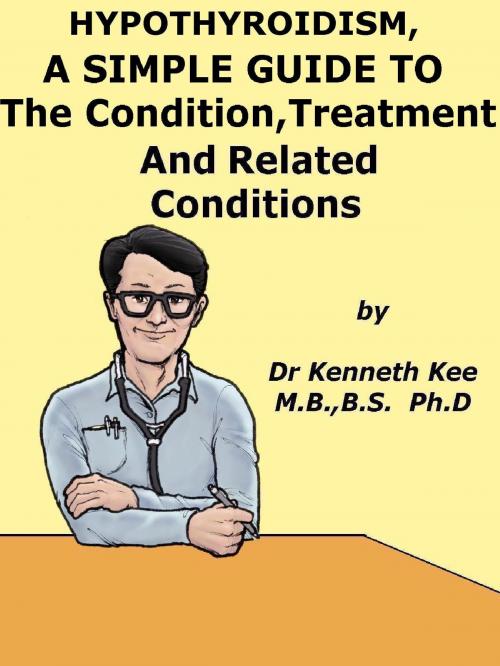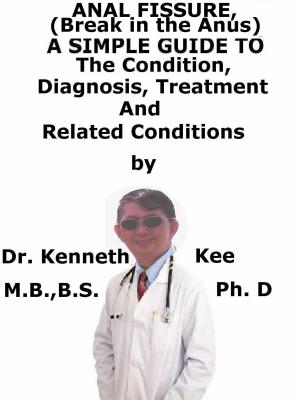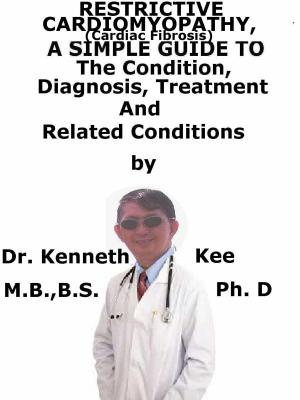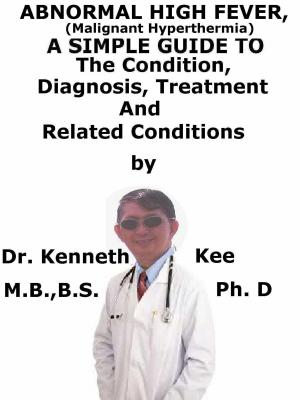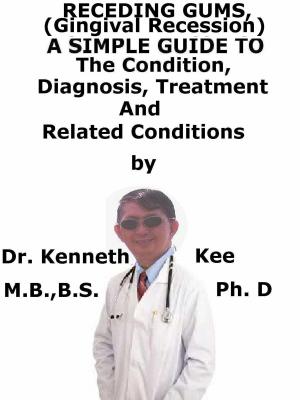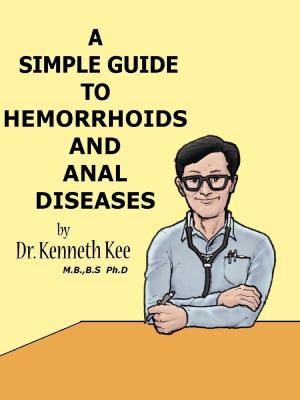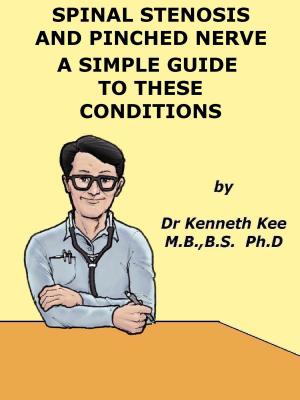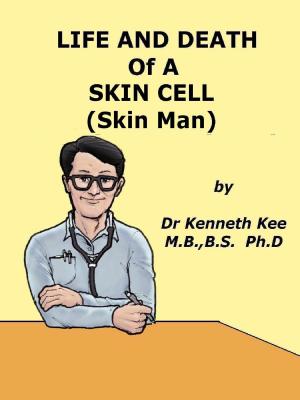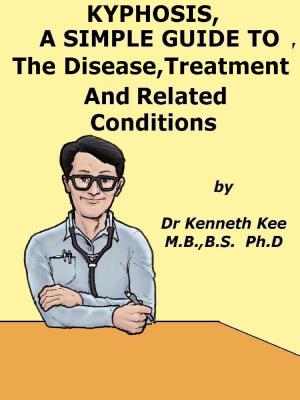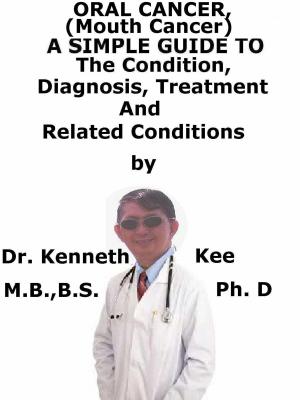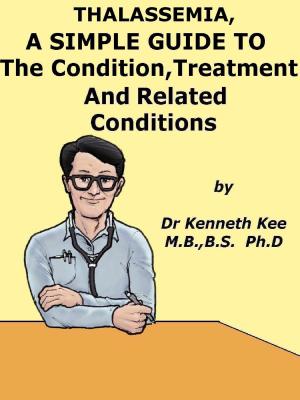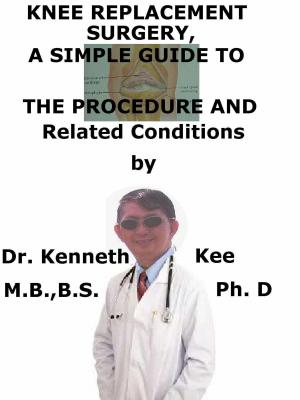Hypothyroidism, A Simple Guide To The Condition, Treatment And Related Conditions
Nonfiction, Health & Well Being, Medical, Specialties, Internal Medicine, Endocrinology & Metabolism| Author: | Kenneth Kee | ISBN: | 9781311916754 |
| Publisher: | Kenneth Kee | Publication: | June 3, 2015 |
| Imprint: | Smashwords Edition | Language: | English |
| Author: | Kenneth Kee |
| ISBN: | 9781311916754 |
| Publisher: | Kenneth Kee |
| Publication: | June 3, 2015 |
| Imprint: | Smashwords Edition |
| Language: | English |
The thyroid is the gland in the center of the neck
When a person is tired and fat, it is usually thyroid hormones she lack
She will feel cold and has a large protuberant tongue
There will slow movements and thoughts out front
There will also be enlargement of the thyroid gland
There will dry coarse skin and unusual weight gain
The most common cause is due to old age
Other include radioactive iodine taken in excess dosage
Some are due to excess removal of thyroid during surgical action
Or autoimmune response to thyroid inflammation
Treatment is usually with synthetic thyroxine
To be taken orally for life. No need for iodine.
-An original poem by Kenneth Kee
Interesting Tips about the Hypothyroidism
A Healthy Lifestyle
1. Take a well Balanced Diet
2. Treating an underactive thyroid
Treatment is aimed at replacing the thyroid hormone that you are lacking.
Levothyroxine is the most commonly used medicine:
The lowest dose possible will be given that relieves your symptoms and brings your blood hormone levels back to normal.
If you have heart disease or you are older, your doctor may start you on a very small dose.
Most people with an underactive thyroid will need to take this medicine for life.
When starting your medicine your doctor may check your hormone levels every 2 to 3 months.
After that your thyroid hormone levels should be monitored at least once every year.
When you are taking thyroid medicine, be aware of the following:
Do not stop taking the medicine when you feel better.
Thyroid medicine works best on an empty stomach and when taken 1 hour before any other medications.
3. Keep bones and body strong
Bone marrow produces our blood
Eat foods rich in calcium like yogurt, cheese, milk, and dark green vegetables.
Eat foods rich in Vitamin D, like eggs, fatty fish, cereal, and fortified milk.
Eat food rich in Vitamins B and C such as green vegetables and fruits
Zinc and other minerals are important to the body
4. Get enough rest and Sleep
Avoid stress and tension
5. Exercise and stay active.
It is best to do weight-bearing exercise such as walking, jogging, stair climbing, dancing, or lifting weights for 2½ hours a week.
One way to do this is to be active 30 minutes a day at least 5 days a week.
Begin slowly especially if a person has not been active.
6. Do not drink more than 2 alcohol drinks a day for a man or 1 alcohol drink a day for a woman.
Alcohol use also increases the chance of falling and breaking a bone.
Alcohol can affect the neurons and brain cells.
7. Stop or do not begin smoking.
It also interferes with blood supply and healing.
Chapter 1
Hypothyroidism
Hypothyroidism is also more common in women than in men.
Most of the cases of Hypothyroidism seen at the clinic are secondary Hypothyroidism due to lack of thyroid hormones either they were too aggressively treated for Hyperthyroidism or sometimes due to loss of thyroid hormones as part of aging.
The treatment for Hypothyroidism is thyroxine tablets of 50 to 100 mcg daily for life.
Most of the patients have no symptoms.
Hypothyroidism cases are more common than hyper thyroid cases.
What is Hypothyroidism?
Hypothyroidism is a condition caused by insufficient production of the thyroid hormones, usually more common in females.
What are the causes of Hypothyroidism?
Primary causes:
1. Congenital:
a. Aplasia (no thyroid),
b. Hyperplasia (small thyroid),
c. Ectopic (not at normal site) thyroid gland
2. Autoimmune Thyroiditis (Hashimoto thyroiditis):
Inflammation causes insufficient production of thyroid hormones
3. Iodine deficiency can cause less production of thyroxine
Secondary Causes:
1. Radioactive iodine reduces production of thyroid hormones
2. Excess removal of thyroid gland causes reduced production of thyroid hormones.
3. Hypothyroidism during or after pregnancy.
The thyroid is the gland in the center of the neck
When a person is tired and fat, it is usually thyroid hormones she lack
She will feel cold and has a large protuberant tongue
There will slow movements and thoughts out front
There will also be enlargement of the thyroid gland
There will dry coarse skin and unusual weight gain
The most common cause is due to old age
Other include radioactive iodine taken in excess dosage
Some are due to excess removal of thyroid during surgical action
Or autoimmune response to thyroid inflammation
Treatment is usually with synthetic thyroxine
To be taken orally for life. No need for iodine.
-An original poem by Kenneth Kee
Interesting Tips about the Hypothyroidism
A Healthy Lifestyle
1. Take a well Balanced Diet
2. Treating an underactive thyroid
Treatment is aimed at replacing the thyroid hormone that you are lacking.
Levothyroxine is the most commonly used medicine:
The lowest dose possible will be given that relieves your symptoms and brings your blood hormone levels back to normal.
If you have heart disease or you are older, your doctor may start you on a very small dose.
Most people with an underactive thyroid will need to take this medicine for life.
When starting your medicine your doctor may check your hormone levels every 2 to 3 months.
After that your thyroid hormone levels should be monitored at least once every year.
When you are taking thyroid medicine, be aware of the following:
Do not stop taking the medicine when you feel better.
Thyroid medicine works best on an empty stomach and when taken 1 hour before any other medications.
3. Keep bones and body strong
Bone marrow produces our blood
Eat foods rich in calcium like yogurt, cheese, milk, and dark green vegetables.
Eat foods rich in Vitamin D, like eggs, fatty fish, cereal, and fortified milk.
Eat food rich in Vitamins B and C such as green vegetables and fruits
Zinc and other minerals are important to the body
4. Get enough rest and Sleep
Avoid stress and tension
5. Exercise and stay active.
It is best to do weight-bearing exercise such as walking, jogging, stair climbing, dancing, or lifting weights for 2½ hours a week.
One way to do this is to be active 30 minutes a day at least 5 days a week.
Begin slowly especially if a person has not been active.
6. Do not drink more than 2 alcohol drinks a day for a man or 1 alcohol drink a day for a woman.
Alcohol use also increases the chance of falling and breaking a bone.
Alcohol can affect the neurons and brain cells.
7. Stop or do not begin smoking.
It also interferes with blood supply and healing.
Chapter 1
Hypothyroidism
Hypothyroidism is also more common in women than in men.
Most of the cases of Hypothyroidism seen at the clinic are secondary Hypothyroidism due to lack of thyroid hormones either they were too aggressively treated for Hyperthyroidism or sometimes due to loss of thyroid hormones as part of aging.
The treatment for Hypothyroidism is thyroxine tablets of 50 to 100 mcg daily for life.
Most of the patients have no symptoms.
Hypothyroidism cases are more common than hyper thyroid cases.
What is Hypothyroidism?
Hypothyroidism is a condition caused by insufficient production of the thyroid hormones, usually more common in females.
What are the causes of Hypothyroidism?
Primary causes:
1. Congenital:
a. Aplasia (no thyroid),
b. Hyperplasia (small thyroid),
c. Ectopic (not at normal site) thyroid gland
2. Autoimmune Thyroiditis (Hashimoto thyroiditis):
Inflammation causes insufficient production of thyroid hormones
3. Iodine deficiency can cause less production of thyroxine
Secondary Causes:
1. Radioactive iodine reduces production of thyroid hormones
2. Excess removal of thyroid gland causes reduced production of thyroid hormones.
3. Hypothyroidism during or after pregnancy.
